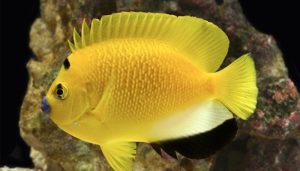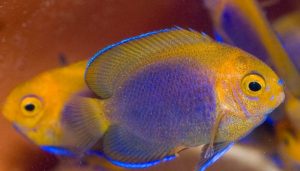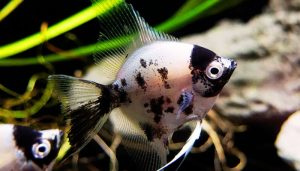Guppies are an incredibly popular freshwater fish that can be kept in home aquariums and ponds, making them the perfect addition to any aquatic environment. One question often pops up in the minds of many novice aquarists: are guppies schooling fish?
Regarding aquatic life, we often assume that all fish behave in a certain way. But research suggests that schooling is less common among fish species than you think.
Knowing whether our beloved guppies form schools or not is necessary for their safety to be at risk- especially when they coexist with predators that might eat guppies in the community tank.
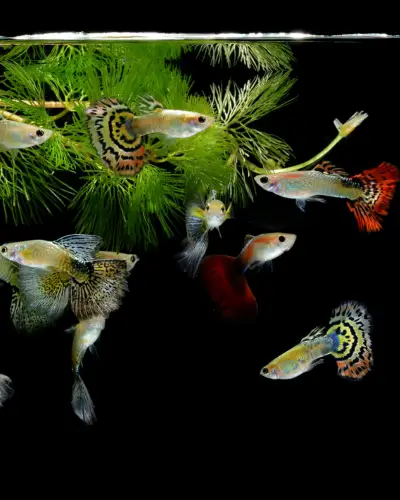
So, are guppy schooling fish? The answer may not be as clear-cut as you think! This blog post will explore all the confusion surrounding this common topic and hopefully give you a better understanding of your pet guppy’s behavior.
So please keep reading to learn why guppies act as they do in their aquatic habitats!
Table of Contents
ToggleAre Guppies Schooling Fish?
Are guppies a schooling fish? The answer is yes; guppies are incredibly social fish, finding solace and security in the presence of their school. When threatened by danger, they rely on one another for protection through close-formation swimming.
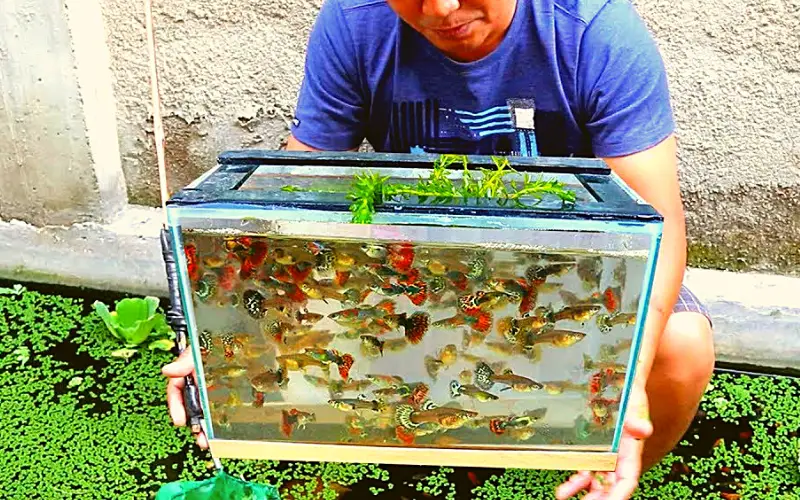
Guppies bond to ensure no member feels isolated or alone – even underwater! This behavior is known as schooling, and it’s a perfect example of how animals that live together also need to rely on one another for safety.
Why Do Guppies Like to School?
Schooling is often seen as a defense mechanism against predators. As guppies swim together, they are more likely to be spotted by predators looking for easy prey.
If a predator snatches up any guppy fish, their buddies will quickly move away and form a new school of guppies.
Additionally, guppies rely on their schools for hunting and feeding. Through schooling, they can increase the size of their social group, making it easier to find food. They also use schooling as a communication tool to alert one another of potential threats or other food sources.
Will Guppies School with Other Schooling Fish?
Do guppies school together with other types of fish? Guppies are gentle and peaceful fish that can coexist harmoniously with other aquatic life. However, it’s important to note they need the right company – guppies will only school together if their species look similar!
Are guppies community fish? Most likely, guppies will school with other peaceful fish such as cardinal tetras, Cory catfish, harlequin Rasboras, Honey gourami, Barbs, nerite snail, and danios. They may also school with other guppy varieties of the same species, size, color, and shape.
Schooling Vs. Shoaling – What Are Schooling Fish and Shoaling Fish?
is guppy a schooling fish? Schooling Guppies and Predators: Though often confused, schooling and shoaling fish are different behaviors seen in fish. Schooling involves a large group of schooling fish swim together and is usually done to keep them safe from predators.
By “schooling,” all fish within the group move together, each casting a unique part of this unusual synchronized movement!
Shoaling is a less-structured gathering and involves smaller groups of fish that are typically related and have similar sizes, colors, and shapes. Shoaling is more of a form of socialization than protection from predators.
Do Guppies Need to Be in Groups?
Yes, guppies should typically be kept in groups. Most experts recommend that guppies live in a group of at least five to eight guppies for optimal health and behavior.
When housed alone or in male-female pairs, the fish can feel threatened, leading to sickness or death. Keeping them in groups also allows their natural behaviors to shine through – they often school together and swim happily.
Additionally, larger groups may decrease aggression between males by spreading their attention among multiple females instead of fighting over one.
So while it is possible to keep guppies alone or as male/female pairs, it is generally not recommended for their overall well-being!
How Many Guppies to Keep to Allow Schooling?
Minimum Guppy School Size: How many guppies are best kept together? Generally, a minimum of 3-6 fish is recommended for optimal schooling. However, a larger group – 10-20 fish – would be best if you want to allow for more natural habitat and proper schooling.
It’s important to remember that guppies need enough swimming space and that overcrowding can lead to stress. So make sure your fish tank has the right size and conditions for the number of guppies, such as ten to fifteen guppies you plan on keeping.
Are Guppies Aggressive?
No, guppies are not typically an aggressive species of fish. They may display defensive behaviors such as nipping at the fins of other fish or chasing away larger tank mates, but this is usually done out of self-preservation rather than aggression.
In a peaceful aquarium environment that does not contain overly large fish, guppies rarely show any signs of aggression and instead, get along peacefully with their counterparts.
However, suppose the aquarium environment is overcrowded, or there is competition for limited resources such as food and shelter in the planted tanks. In that case, some guppies may act aggressively towards other guppy tank mates to maintain their territory or secure resources.
Can Guppies Live Alone?
No, guppies should not be kept alone. Guppies are highly social fish and thrive in schools of other guppies. The thriving guppy population requires a minimum group size of at least five and should ideally be kept in larger groups for optimal health and well-being.
If you are considering keeping guppies, it is important to ensure that the tank size is large enough to accommodate the group of shoaling fish you plan on housing. This will ensure that they have enough space to swim and explore.
Overcrowding can lead to stress, aggression, and poor health, so providing the best environment for your guppies is important.
How Many Guppies Can You Have in a 10-gallon Tank?
You can keep 5-6 guppies in a 10-gallon tank. This is because guppies are relatively small, with the smallest species only growing up to about two inches in length.
The more fish you add, the less space each of them will have, so it’s important to consider that when deciding how many guppies you want. It’s also a good idea to stay aware of overcrowding and provide plenty of hiding spots for your fish, as they need space to feel secure.
Furthermore, ensure you provide adequate filtration and frequent water changes to ensure their health and safety!
Do Male Guppies Swim Together?
Yes, male guppies do swim together. This is because they are highly social fish and enjoy the company of their species.
Males typically form small shoals, which allow them to move around in search of food and a mate. During courtship, males cruise from group to group, looking for a suitable female.
Additionally, these groups create protection against predators since it’s difficult for a predator to pinpoint one guppy when there are several in the same direction.
Commonly Asked Questions about Guppies Community Fish (FAQ)
Will a Single Guppy Get Lonely?
Guppies can become lonely if they are the only fish in the tank. Guppies are social creatures and need to be in a group to thrive. Therefore, keeping at least three guppies in the fish tank is best so they can interact and form a school.
Are Fancy Guppies Schooling Fish?
Yes, fancy guppies are schooling fish. They form small groups with other guppies and enjoy the company of their own species. Fancy guppies also display courtship behaviors and may engage in chases and nips to attract a mate.
Do Guppies Have to be in Groups of the Same Size?
No, guppies do not need to be in groups of the same size. Guppies have been known to form social hierarchies, with larger males at the top and smaller females at the bottom. This does not mean guppies should be kept in an overcrowded tank, but they do not have to all be the same size.
Do Guppies Prefer to School in Dark or Light?
Guppies prefer to school in areas of low light. This is because they feel more secure and can better hide from predators. However, this does not mean guppies should be kept in a completely dark tank.
Are Guppies Good Beginner Fish?
Are Guppies Easy to Take Care Of? Guppies are good beginner fish as they are relatively hardy and easy to care for. They can adapt to various water parameters and are not too demanding regarding food. Additionally, they are active and colorful fish that can provide hours of entertainment for the whole family.
How Much Are Guppies Fish?
Guppies typically cost between $2 and $5 each. Prices can vary depending on the fish’s size, color, and quality. Fancy guppies tend to be more expensive than regular guppies as they are bred for their colorful patterns and striking fins.
Will Different Types of Guppies School Together?
Yes, different guppy species can school together. This is because they do not recognize each other by their species but rather by the size of their fins, body shape, and color. Therefore, guppies of different colors can form small groups and coexist peacefully.
Are Endler Guppies Schooling Fish?
Are Endlers Schooling Fish? Yes, Endler guppies are schooling fish. They will form small shoals with other Endlers and swim together for food and a mate.
Are Mollies Schooling Fish?
Yes, mollies are schooling fish. They gather in small groups and swim together for food and a mate. Additionally, they form a sense of safety in numbers, making them more difficult for predators to spot. Therefore, keeping mollies in groups of at least three or four is best.
Are Platies Schooling Fish?
Yes, platies are schooling fish and prefer to live in groups of at least five of their species. Living in groups provides them with safety, comfort, and social interaction. They also benefit from the shoaling behavior that enables them to find food more efficiently.
Are Guppies Freshwater Fish?
Yes, guppies are freshwater fish. They belong to the Poeciliidae family and originate from shallow, slow-moving rivers and streams in South America. Guppies are small in size and come in a variety of colors. Aquarium enthusiasts also prize them for their hardiness and bright, colorful appearance.
Are Tetras Schooling Fish?
Yes, Tetras are schooling fish from the family Characidae. These small, peaceful fish typically form groups of six or more as they swim and interact with each other in the waters. The iconic vivid colors of Tetras also make them aesthetically pleasing to keep and watch. With eAre Fancy Guppies Schooli, Tetras can make an excellent addition to any freshwater community tank.
How Do Guppies Swim So Close Without Bumping into Each Other?
Guppies have a very efficient way of swimming close to one another. They can sense their neighbors’ movements and adjust their swimming patterns accordingly. This allows them to move in a coordinated fashion and create intricate shoaling patterns without bumping into each other.
Will Guppies School with Neon Tetras?
Yes! Guppies and neon tetras make excellent tank mates. They prefer to school together in large groups, so as long as you provide enough hiding spaces and decorations for them to feel secure, they should get along just fine.
How many guppies in a school?
Ideally, aim for 6-12 school of guppies. This provides a sense of security and reduces stress on the fish.
Are guppies social fish?
Is guppy schooling fish? Yes, guppies are social fish! They thrive in groups. Keeping them alone can stress them out. Aim for a school of at least 5 females per male.
Do guppies need a school?
Guppies are social, not schooling. They do best in groups of 3+ for company, but don’t swim in tight formations like neon tetras.
What are types of guppy fish in Philippines?
The Philippines is home to various guppy breeds, guppy Philippines including the common “Wild Guppy” (Poecilia reticulata), the “Endler’s Guppy” (Poecilia wingei), , guppy strains Philippines, and many colorful, locally bred varieties.
Final Thoughts
So, do guppies school? In conclusion, guppies are remarkable and fascinating fish. Even though they do not school in the same direction as most other schooling fish, they have many features demonstrating their ability to function as part of a group. For example, the gangly behavior allows them to gather together in large numbers, which adds protection from bigger predators that would otherwise be more threatening.
Additionally, the males’ flamboyant coloration could serve a purpose in gathering larger groups. Guppies are an interesting underwater species that need more attention for their unique adaptations and quirks. We can learn more about them and how to best care for these beloved fish by researching their schooling behavior and needs. Learning how these incredible creatures function within our ponds and aquariums could give us an even better understanding of how aquatic biodiversity works throughout different ecosystems – after all, it’s quite amazing what small guppies can do!
You might also like
- Will Different Types of Guppies Breed? (An Exclusive Guide)
- What Does Guppy Fish Eat: 5 Fun & Creative Guppy Diet Ideas
- Does Guppies Need a Heater: A Comprehensive Beginner’s Guide
- How Many Guppies in a 10 Gallons Tank: (An Exclusive Guide)
- Will Different Types of Guppies School Together? (Solved)
- How Big Does Guppies Get: A Comprehensive (Beginner’s Guide)
- How Many Guppies can be in a 20 gallon tank (A Detailed Guide)
- Male Guppies and Female Guppies: 5 Proven Ways to Spot the Gender!
- How Many Days Can Guppies Go Without Food: (Solved & Explained)
- Guppy Tail Rot or Nipping: 3 Key Differences You Should Know!
- 5 Most Expensive Guppy Fish in the World: What You Need to Know
- Are Guppies Hardy for Beginners: 5 Shocking Health Risks Revealed!
- Can Guppies Live in a Pond: A Comprehensive Beginner’s Guide!


